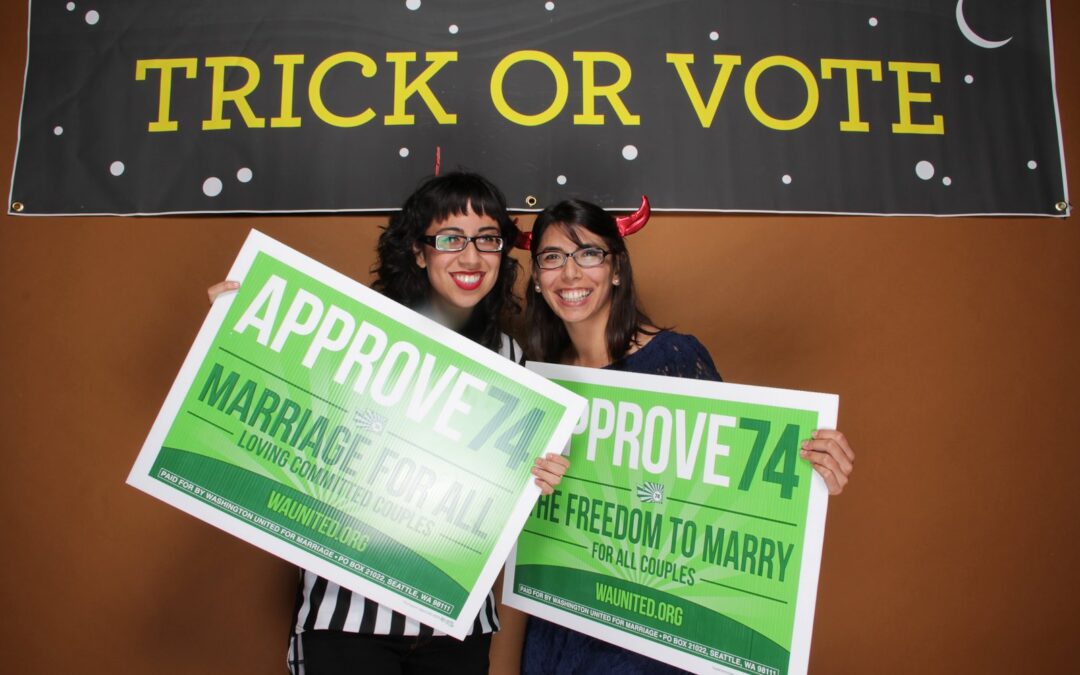
by Bus Admin | Dec 6, 2021 | Uncategorized
Hi Bus fam! I recently had the pleasure of chatting with Tiffany Mendoza, one of our BFF’s who has been on the Bus since our organization’s inception back in 2008! As a fairly new member of the Bus family, I love getting to know the folks who have contributed to our organization’s amazing journey. Thank you Tiffany for our wonderful conversation, your dedication to The Washington Bus has made a tangible difference in our community and has been personally enlightening to learn about! Scroll down to check out some of our chat’s highlights.
Fernando Barceló: I’m curious, what originally brought you to the Bus? And how have you evolved alongside us?
Tiffany Mendoza: I grew up with the Bus in some way: I led a voter registration drive at University of Washington and partnered with the Bus for the first Trick or Vote in 2008! When I returned to the PNW a couple of years later, the Bus was a great tool to connect with volunteer opportunities and meet new people across the sector. I was able to build partnerships with the Bus – collaborating with the fellowship program three different times – and was even part of the board. My relationship with the Bus has evolved over time, but it has always been a place to continue growing community for me.
FB: In your personal opinion, why is it important to contribute to organizations like the Washington Bus?
TM: Building power and change goes beyond any one election cycle – it takes vision and consistency. Oftentimes, progressives say that we need more opportunities for young people, especially from diverse backgrounds, to have a role in our movements for change. The Bus provides the space to build community and collective power to ensure that there is a robust pipeline in Washington’s progressive sphere.
We have witnessed how much can be accomplished when young people help to drive the agenda, including policy and electoral wins. That doesn’t come from nowhere, it is important permanent infrastructure. The question is will there be investment to ensure that we meet the multifaceted needs of this time.
FB: What are some of the latest news you have heard about the Bus?
TM: The Bus has grown up from a scrappy startup organization and with that comes important foundational work. I’ve been proud to see the Bus thoughtfully figure out how to sustain itself and ensure its stability through structures like the new Co-Executive Directors model and by investing in staff.
This has allowed The Bus to have consistency for its continued success while experimenting with how best to reach out to young people, meet them on their terms, and build power with them across Washington State.
FB: Lastly, could you recount a personal story you have with the Bus?
TM: There are a lot of memories associated with the Bus. From the fun events like Trick or Vote and Candidate Survivor to meeting some of my closest friends through volunteering.
The summers of 2013 and 2014 hold special memories for me because I got to partner deeply with the Bus fellows. In those summers, we went door to door in impacted neighborhoods, did a phone bank survey of over 3,000 young people of color and held a concert event (Beat the Heat) in Bellevue to hear about the impacts people are feeling from climate change. It was a precursor to incorporating environmental justice in mainstream platforms. The Washington Bus has always been a leader in building progressive change through youth leadership development!
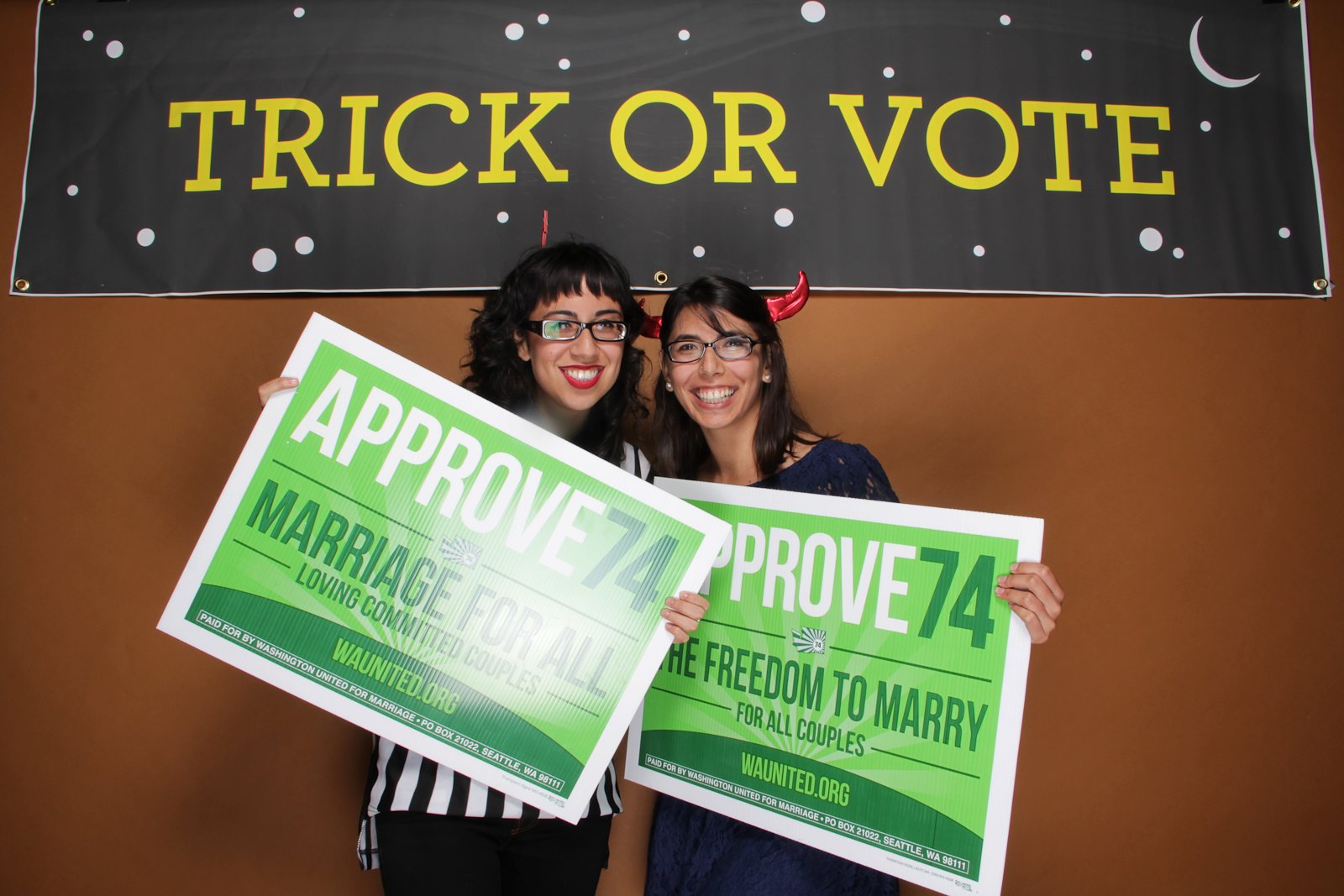 Tiffany Mendoza (right). Trick or Vote: Get out the voter canvass in support of Marriage Equality (Ref 74). Circa 2012.
Tiffany Mendoza (right). Trick or Vote: Get out the voter canvass in support of Marriage Equality (Ref 74). Circa 2012.
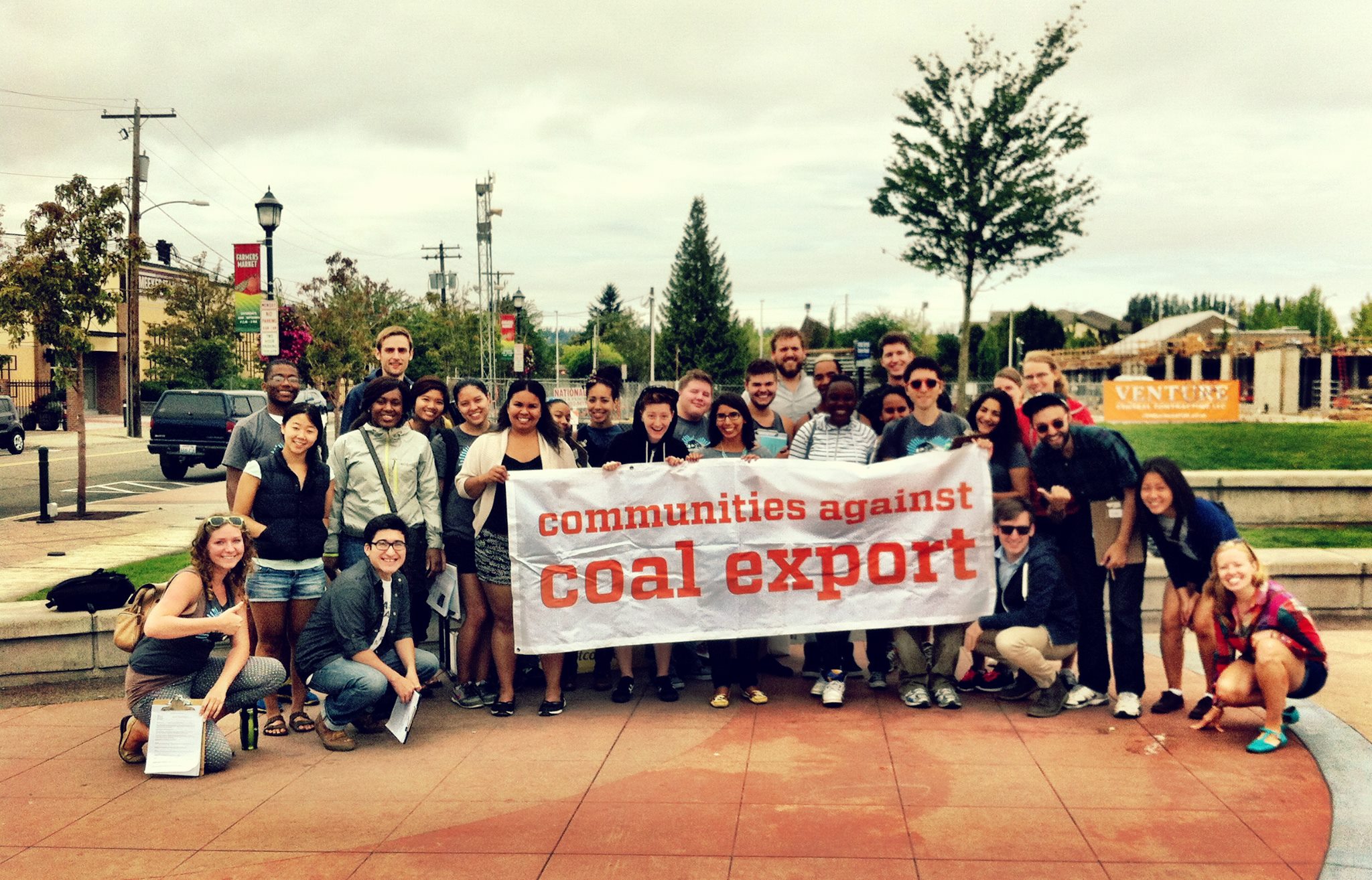 Tiffany Mendoza (center). Day of action with Washington Bus Fellows, Washington Environmental Council & Power Past Coal. Doing a door to door survey of precincts near the train rail lines in Kent to hear about the impacts more coal trains would have on overburdened populations. Circa 2013.
Tiffany Mendoza (center). Day of action with Washington Bus Fellows, Washington Environmental Council & Power Past Coal. Doing a door to door survey of precincts near the train rail lines in Kent to hear about the impacts more coal trains would have on overburdened populations. Circa 2013.
by Bus Admin | May 24, 2021 | Uncategorized
By Angee Pogosian, Washington Bus Legislative Intern
Senate Bill 5096, which concerns a tax on capital gains, has been signed into law. I know what you’re thinking, “another tax?” Let me tell you, I’ve got a cracked windshield, a constant burden of not knowing how I’ll pay for college, and a friend who just Venmo requested me $5 for coffee. If any of this resonates with you slightly then rest assured this tax does not impact you financially; in fact it benefits the vast majority of Washingtonians. Before we get into how this can be, let’s go over the bill.
Senate Bill 5096 will impose a 7% tax on excessive capital gains of $250,000 or more. Capital gains are the profits made on the sale of investments such as stocks, bonds, and real estate. For example, say someone bought 150 shares of Amazon stock prior to the pandemic for $270,000 ($1,800 per share). During the pandemic the value per share went up to $3,500. If that person were to sell all their shares of Amazon, they would have a profit (capital gain) of $255,000. Who is able to spare $270,000 to invest to begin with? Not me, and probably not you. Only the wealthiest Washingtonians are able to afford large investments, giving them the opportunity to become richer during a global pandemic. Meanwhile working families across the state struggle to afford basic needs like housing and childcare. We must invest into our communities; we can do so when the rich pay their fair share.
Yes, this tax is fair. Washington State has the most upside down tax code in the nation. Working people pay proportionally more in income tax than their wealthiest counterparts. Gaining upward mobility and building wealth is increasingly challenging for poor people. Financial literacy is generally not taught in our public education system for working to middle class families to benefit from. Wealth is reproduced generationally from knowledge and resources that are passed down. Investing is a privilege which is becoming one of the few ways that wealth can be accumulated at all.
The revenues made from this tax would fund the Washington State Education Trust, childcare, and the Working Families Tax Exemption. When families are able to access quality education, childcare, and their basic needs, they are more likely to progress socio-economically for themselves and their posterity. Investing in our low and middle income communities benefits everyone, as families will have more money to circulate into the local economy and stabilize their lives. We appreciate Representative Frame for sponsoring this bill, and all the young people who worked hard to get it passed.
by Bus Admin | Mar 2, 2021 | Uncategorized
This opinion piece was written by Annalisa Mueller-Eberstein and does not necessarily reflect the beliefs of the Washington Bus or Washington Bus Education Fund. Annalisa Mueller-Eberstein (she/her) was a Washington Bus Fall 2020 Intern and is currently enrolled as an undergraduate student at the University of Washington planning to pursue dual degrees in Materials Science Engineering and International Affairs. Originally from Kirkland, WA, Annalisa has a passion for working with the environment and her local community—volunteering with and participating in organizations to help achieve her goals. Outside of work and school she enjoys playing with wires, rollerblading, and watching YouTube.
Every study group, town hall, club meeting, the same opening question, “Why do you care about saving the environment?” There is something inherently wrong with this question–save. Save has too much of a positive connotation. We cannot come in as saviors since we were also the destroyers. Save is too meek, passing off the blame to an unseen third party, refusing to acknowledge how much man-made damage has occurred and how much needs to be done to reverse those effects. We must not so much ‘save’ as resurrect our planet, humanity’s mothership in a vast and mostly uninhabitable universe. We must take immediate action to act as a greater force in the opposite, pushing back against the decades of mistreatment that has turned our tiny blue dot gray with smog and smoke.
Recently, the spotlight has sporadically pointed towards environmental issues but not the prolonged attention an issue of this scale deserves for its effects are far-reaching and complex. Tension and stagnation in the Middle East? Lack of accessible water because of drought. Wildfires across the Americas? Changing weather patterns because of the greenhouse gas effect. Anthrax in Siberia? Melting permafrost? We need drastic change with monumental shifts in mindset and policy. We need everyone building from the ground up to create tangible collective impact. We need nested systems putting the environment first, ensuring the needs of the current generation without compromising the ability of future generations to meet their own needs.
During a workshop integrating social and economic needs into a 2020 Sustainability Plan for the City of Kirkland, we took a ‘Sustainability Yoga’ break which yielded a rather entertaining quote:
“Please enter chair pose. Hand outstretched. Look to the right, look to the left. There is no one there. You are in a single-occupancy vehicle. Feel that burning in your thighs? That’s called… shame.”
Which brings us to Washington state and HB 1204/SB 5256, also known as “Clean Cars 2030” or the “Clean Cars Bill.” The bill would require all passenger cars and light-duty trucks to be electric in order to be registered in Washington starting in 2030 with exemptions for some emergency and hydrogen fuel-cell vehicles. Transportation is Washington’s largest individual source of carbon emissions, and according to the Washington Department of Ecology, motor vehicles release roughly three million gallons of petroleum annually into the Puget Sound Basin. The bill was drafted by Representative Nicole Macri (D-Seattle) with assistance from Coltura, a Seattle-based environmental advocacy nonprofit focusing on the transition to electric vehicles.
The Goals of the Clean Cars Bill:
- Increase cheap, clean, renewable electricity produced in-state
- Incentivize private-sector investment in new EVs and charging stations
- Increase opportunities for lower-income Washingtonians (used EVs are cheaper to maintain than vehicles reliant on fossil fuels)
- Reduce carbon emissions and air pollution
Now back to the big picture. We must work for our future. We must work for our planet. After all, we are all in this together, part of the grand musical of life where everyone must play their part, contributing their fullest for humanity’s sake. A beautiful planet for humanity to live on complete with clean water, air, and soil. These are simple requests and the fact that we cannot guarantee they can be fulfilled for the majority of the population now, much less in fifty years, is a frankly terrifying problem we need to solve together.
We can (almost) all agree on that, yet very few of us have been carbon neutral, even fewer have been carbon negative. My suggestion is we all become carbon negative. If we wish to have lives comparable to now with sunshine to bask in, trees to scamper up, and chicken noodle soup to soothe the soul, we must act now, shifting our ways of thinking and common practices to fulfill a larger goal. Homes will need to become smaller, meat less common, and agriculture more sustainable. However, that is a small price to pay in comparison to the billions in capital and people lost to natural disasters and the side effects of warming temperatures. Time to look into local food sources, vegetarianism, mass transit, shorter showers, composting, and follow through.
More Information on Clean Cars 2030:
Coltura: https://www.coltura.org/washington-clean-cars
Clean Cars 2030 Fact Sheet: https://drive.google.com/file/d/1a2lRHBGDhNccoMMBWVbFJTEap20FkP_1/view
Clean Cars 2030 FAQ: https://drive.google.com/file/d/1HLLi9bMYsS_3Wyq0J8TF1tbJQVwkQpwU/view
by Bus Admin | Jan 25, 2021 | Uncategorized
This opinion piece was written by Annalisa Mueller-Eberstein and does not directly reflect the beliefs of the Washington Bus or Washington Bus Education Fund.
Annalisa Mueller-Eberstein (she/her) was a Washington Bus Fall 2020 Intern and is currently enrolled as an undergraduate student at the University of Washington planning to pursue dual degrees in Materials Science Engineering and International Affairs. Originally from Kirkland, WA, Annalisa has a passion for working with the environment and her local community—volunteering with and participating in organizations to help achieve her goals. Outside of work and school she enjoys playing with wires, rollerblading, and watching YouTube.
How much research do you really do into the candidates on your ballot? Now, how much do you do into the advisory votes, plebiscites, and referendums? When you see a phrase like “shall King County Charter Section 895 concerning mandatory inquests be amended,” how much do you really understand? (King County Charter Amendment 1). Research into candidates is already difficult to initiate, research into the processes of inquests (judicial inquiries) and taxes regarding heavy machinery is even more difficult with its classically boring subject matter and lack of human connection.
Fun fact, Napoleon was made emperor by a plebiscite in 1804. A plebiscite (pleh-buh-sait), also referred to as a referendum, initiative, or public vote, is defined as a vote by which the people of an entire country or district express an opinion for or against a proposal. Here are the practices in Washington (plebiscites mentioned from the 2020 ballot):
- Referendums: laws put on the ballot for the people by the legistors
- Referendum 90: statewide vote on whether or not Engrossed Substitute Senate Bill 5395 mandating comprehensive sexual education should be implemented
- Propositions: mainly concern funding for public projects like transit or schools
- Seattle Proposition #1: concerns increasing funding for transit
- Initiatives: issues directly put on the ballot by the people
- Amendments: directly impact the rules governing a state, county, or region
- King County Charter Amendment #5; vote on whether the Sheriff will be an elected official again rather than chosen by the County Council
- Advisory Votes: requires any tax or fee increase that’s passed to appear in the voters’ pamphlet and on the November General Election ballot
- A result of a Tim Eyman initiative several years ago
- Basically a public opinion poll that costs the state and counties more than $500,000 each election
One’s first instinct is usually to try to spend less money which means it is natural for one to instinctually vote to repeal any new taxes they see on the ballot, as evidenced by the fact that every advisory vote on the Washington statewide ballot in 2020 received a majority vote to ‘repeal’ rather than ‘maintain’. Part of the issue is that people do not read into the voter pamphlet or explanatory statements. Another issue is that even if they do, they may not completely understand what is written or the description may leave out something vital. For example, initially, I thought the state funds referred to in the proposed Constitutional Amendment on the Washington State ballot would only be invested in government bonds and general funds; however, the actual text allows for investment in specific private stocks as well, relying on the general upward trend of the stock market to cancel out any economic downturns.
The Founding Fathers made the case to avoid uneducated voters, and I have to agree that representative democracy is favorable to direct democracy where expert opinions are overlooked in favor of political agendas or misinformation. I realize in today’s political climate, expert opinions are often disregarded, but one issue at a time. This situation is not unique to Washington State or even the United States.. In Australia, for example, in 2017, the question of whether Australia would support same-sex marriage was put to the people as part of a mailed national survey. This begs the question, why are some people’s rights up for election? If no single group of people should be explicitly targeted in politics in general, no group’s rights should be put up to the general public to decide on. That is just so sus.
Direct democracy has its place in hearing the people’s opinion, and the fact that the road is open for motivated citizens to put something on the ballot is good; however, one must avoid becoming too reliant on furthering popular sovereignty rather than implementing needed change. If a school needs more money to rebuild and provide supplies to students, a majority vote shouldn’t be able to prevent that. Also, plebiscites have an unfortunate connection to authoritarian regimes trying to legitimize their regime. This comes from the fact that many authoritarian leaders will substitute an opposition party by pretending to give power to the people to voice dissent or enact change.
Remember Napoleon’s ‘election’ in 1804? Records show he won 99 percent of the vote, but some sources also show that there was doctoring of the votes in the army and one has to wonder what would happen to those who voted no, especially after witnessing the destruction and death in the French Revolution. Either way, with 99 percent of the one million voters behind him, Napoleon could show that he was unanimously supported and begin consolidating power into his office. A more recent, yet still slightly suspicious situation occurred in Crimea in 2014 where the official result was a 96.77 percent vote for integration of the region into the Russian Federation with an 83.1 percent voter turnout while previous polls indicated support levels of between 30 and 45 percent.
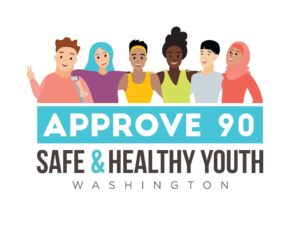
by Bus Admin | Oct 30, 2020 | Uncategorized
You probably don’t need many more reasons to convince you that the 2020 election is SUPER important. But while you’re here, let me tell you about a really important issue on your ballot here in Washington: comprehensive sex education. 
Referendum 90 (“R90”) is our opportunity to weigh in on a law that Washington lawmakers passed earlier this year. The law requires school districts to teach comprehensive, age-appropriate and inclusive sexual education. The curriculum varies significantly by grade, of course, but there are state standards for all K-12 students. This law will only go into effect if Washington voters (like you!) vote to APPROVE Referendum 90. Here are ten reasons why you should be pumped to support Referendum 90 on your ballot:
- Quality sex ed keeps young people safe. Young people who get a comprehensive sex education are less likely to engage in risky sexual behavior, contract a sexually transmitted infection or have an unintended pregnancy. These are serious things and helping young folks avoid them is a big deal.
- R90 requires age appropriate education throughout K-12. Starting early means more time to learn, grow and understand important issues. Under R90, students in kindergarten and early grades focus on social-emotional learning. As students get older, the curriculum transitions to more mature and age appropriate topics covering sexual health, consent, STIs, and other topics.
- We NEED to teach young people about consent. Sexual assault and sexual violence are huge issues across our country, and especially among young people. Teaching youth the importance of consent, how to respect boundaries, how to ask for consent and how to understand withdrawing consent is a huge step in the right direction. This is a really important part of R90’s curriculum. R90 also includes lessons on bystander training and intervention.
- Our education needs to include LGBTQ+ youth in positive ways. Approving R90 means LGBTQ+ youth will be reflected positively in sexual health education. This is a valuable and impactful way to make our educational system more inclusive and to widen acceptance and respect among teachers and peers.
- R90 promotes racial equity. Students of color experience stigma and harmful stereotypes throughout our education system, and sex education is no different. Schools that teach disproportionately Black and Brown students are more likely to use abstinence-only education. Furthermore, students of color often experience increased societal stigma against their sexual freedom.
- Children at risk of abuse need a way to ask for help. R90 will keep children safer from abuse. Children who are being sexually abused often don’t understand what is happening until they are provided with the tools and language to communicate the situation with a trusted adult.
- This is about expanding access, not mandating it. Our community is safest and strongest when everyone has access to these lessons. That being said, R90 still allows parents to opt their children out of lessons if they choose to. This isn’t a state mandate, but rather an important expansion of access to critical lessons, information and growth.
- A ton of dope community orgs support R90! When our most trusted community organizations rally together to support a cause, you know it’s serious. R90 is endorsed by Washington Student Association, ACLU of Washington, Planned Parenthood, King County Sexual Assault Resource Center, Gender Justice League, Disability Rights Washington, Justice for Girls Coalition of Washington State, Northwest Progressive Institute, Sexual Violence Law Center, Washington State Association of School Psychologists and many others!
- Direct democracy is super cool and your voice matters. This one is a bit nerdy, but honestly who cares! We’re lucky to be in Washington where we have a lot of opportunities to weigh in on really, really big policies and issues as VOTERS. Every voter in Washington has the chance to support (or oppose) Referendum 90. A lot of states don’t work like this! We don’t need to call our lawmakers, go to Olympia, lobby, or anything like that. We vote. And if we vote to approve R90, young folks for generations to come will benefit from our decision to support sex ed!
- The Bus LOVES R90! It’s true! We’ve been working hard to get the vote out for R90 and remind young folks of why this referendum is SO important. Just the other night we texted over 25,000 young folks in one night about R90 (see pic below). If you’ve read this far, you’re probably a fan of the Bus and we think you should be a fan of R90 as well 🙂
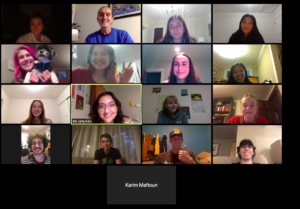

by Bus Admin | Oct 21, 2020 | Uncategorized, Voter Registration, Voting
Leila is the Communications and Outreach Coordinator at the Bus. She’s passionate about making sure voting works for all of us.
Are you a new voter? Does everyone keep telling you to vote, but then forgetting to give you the details? ( We see you Facebook, Snapchat, and every Insta influencer ever). You’ve come to the right place. Let’s break it down.
How do I get registered to vote?
Registering to vote is *easy* in Washington State. You can do it online, with a Washington State ID, or in person (you’ll need a valid form of ID, like your social security card). Register online up until 8 days before election day, at www.registerinwa.org. This election season, that means the deadline is October 26th. If you’d like to check if you’re registered, or update your address, you can visit the voter portal at www.votewa.gov. In Washington, you can register in person all the way up to election day at a vote center. On election day, we have same day registration and voting, meaning you can go to a vote center, get registered, and vote, all in the same day.
Side note… where are the Vote Centers? And what can I expect if I visit one?
Vote centers are available across Washington to register new voters, update current voter records, obtain a voter registration card and to provide assistance to voters who need help completing their ballot. Trained staff and specialized equipment are available to help voters with disabilities cast a private, independent ballot. Each county has at least one Vote Center, which is often the elections office. Many counties also open additional Vote Centers when ballots drop, which is 18 days before election day (Oct 16th this year!). Those hours might vary. You can google “Washington State Vote Centers”, or “King County Voter Centers”, if you live in King County. Your county’s election department website will let you know location and hours.
Am I eligible to vote?
In order to register or pre-register to vote, you need to be 16 years old and a US Citizen, living in Washington State. Sixteen and 17 year olds can pre-register, meaning you’ll automatically be registered to vote when you turn 18.
Ok, I’m registered to vote. Where’s my ballot?
In Washington State, we ALL vote by mail. This means that your ballot will come to the address on your voter registration 18 days before the election. The Secretary of State’s website always has these dates easily available, by the way, so check them out: www.sos.wa.gov. This is why it’s so important to check that your voter registration lists your current address, and update it if not! Again, you can do that at votewa.gov, or at a Vote Center. Did you miss the deadline to update your address, and really don’t want to go to a vote center? The voter portal (again, www.votewa.gov) let’s you print out your ballot. You can also track your ballot there, so you can see when it was sent to you, and when you return it, you can check if it was counted.
I got my Ballot. IT IS SO LONG. How do I figure out what to vote for?
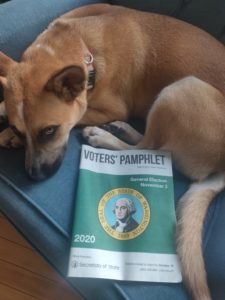
Even pets like the Voter’s pamphlet.
You are right. It is long. In Washington State, we sometimes have up to SEVEN elections a year, depending on where you live, and the ballot can be three pages long, or more. Every voter gets sent a voter pamphlet by the Secretary of State, contains an explanation of the positions up for election on the ballot, and statements from each candidate. For referendums and initiatives, it contains an official explanation and a statement from each campaign stating why they think you should vote no, or yes.
Looking for more info? Another thing to do is check out voter guides. Local newspapers do voter guides and endorsements, issue based organizations do voter guides, and you could even check out local activists and media folks on social media. Fuse does a progressive voters guide, and issue based organizations like Washington Conservation Voters ( who are all about voting in green candidates) release a list of endorsements. The Washington Bus does the same. These are kind of like a cheat sheet – if you think that the organization that released the voter guide represents your values, it can be a good sign if they endorse your candidate or ballot measure. It’s always a good idea to check out several, and do your own research if you have time.
Depending on the year, you could be voting for representation at the federal level, like President, and at the state level, like your Governor and your state Senator. We vote at the county level for your County Executive (like the mayor of your county) and your county council representatives, and at the city level, for Mayor. You could vote for your School Board Representative, who controls so much about how education is funded and implemented, or your City Council-member, who passes municipal laws and helps control how city taxes are spent. Judges control how the criminal justice system is enforced, and can have huge influence on the school to prison pipeline.
Ballot measures are piece of proposed legislation which voters decide on. They are sometimes about implementing a local tax for specific funding, or they could be about implementing a law. Proposition 1, which is on the Seattle Ballot, implements a sales tax to fund public transportation (whoooo Buses!). Referendum 90 asks voters to decide whether comprehensive sex education should be implemented in K-12 schools.
The bottom line is, you don’t have to vote for everything on the ballot – it’s your ballot. However, these local officials and local ballot measures often impact our daily lives so much – everything from whether your community has good public transportation, to if local businesses thrive, to testing requirements in schools. If you’re wondering who these elected officials are, because you’ve never heard of them – that could be a red flag. How much outreach are they doing to your community? Are they passing laws that benefit you and your neighbors? Making sure you vote with your values is the best way to change how local government works and who it represents.
Alright, I filled out my ballot. Are you sure it will be counted?
Heck yeah! You’re on it. Your ballot needs to be filled out in black or blue pen, and you need to make sure it is signed. Your signature needs to match either the signature on your driver’s license or ID, or the signature on your voter registration. Making sure your phone number or email is on your voter registration gives your county elections department a chance to contact you if for some reason your ballot gets flagged because your signature doesn’t match. You can add that information at the voter portal (votewa.gov), or go to a vote center to update your signature.
How do I turn in my ballot?
You can either put your ballot in the mail, no postage required, or put it in a ballot drop box. Every county has a map of where drop boxes are located. For King County, that map is here, and for Pierce County, that map is here. Often they are located at local community centers, libraries, on college campuses, etc.
You need to make sure your ballot is postmarked by Nov 3rd (election day) (meaning the post office received it and marked it as received that day) or put it in a Ballot drop box by 8pm Nov 3rd.
Ok, I did it. That was stressful. How can I make it more fun?
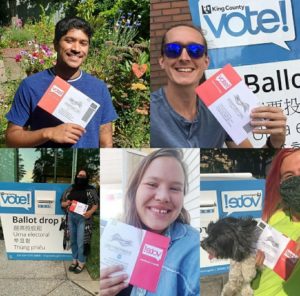
Washington Bus Staff and Friends, getting their vote on!
Call your friends! Do it together (over facetime? #pandemictimes). Get your neighbors to walk to your local ballot box together. Voting is something that our whole community can be a part of – even if you’re not eligible to vote – by reminding and educating each other about the importance of voting in every election.
Congratulations, you did it. Now go remind three friends to vote. You’re amazing for making it through and adding your voice to the ballot box.
Other good things to know:
- Folks with felonies can vote in WA. You need to re-register, and you have to no longer be in community custody (under the authority of the Department of Corrections, or on parole). Check out more details on the SOS website, here.
- Voting with a disability? Accessible Voting Units are available at each Vote Center. Find out more here. You can request reasonable accommodation from the Elections office, according to the Americans with Disabilities Act.

 Tiffany Mendoza (right). Trick or Vote: Get out the voter canvass in support of Marriage Equality (Ref 74). Circa 2012.
Tiffany Mendoza (right). Trick or Vote: Get out the voter canvass in support of Marriage Equality (Ref 74). Circa 2012.  Tiffany Mendoza (center). Day of action with Washington Bus Fellows, Washington Environmental Council & Power Past Coal. Doing a door to door survey of precincts near the train rail lines in Kent to hear about the impacts more coal trains would have on overburdened populations. Circa 2013.
Tiffany Mendoza (center). Day of action with Washington Bus Fellows, Washington Environmental Council & Power Past Coal. Doing a door to door survey of precincts near the train rail lines in Kent to hear about the impacts more coal trains would have on overburdened populations. Circa 2013.




